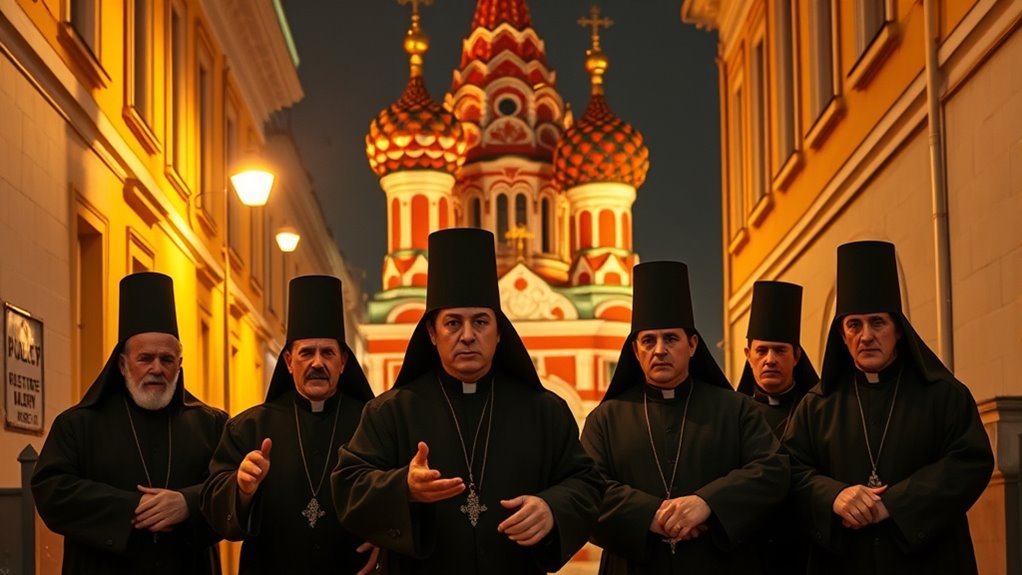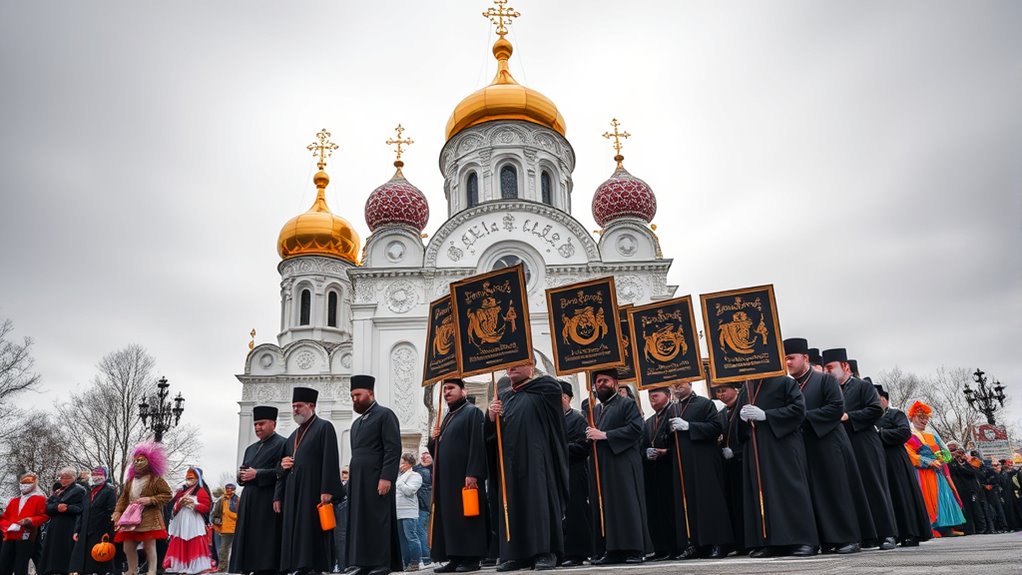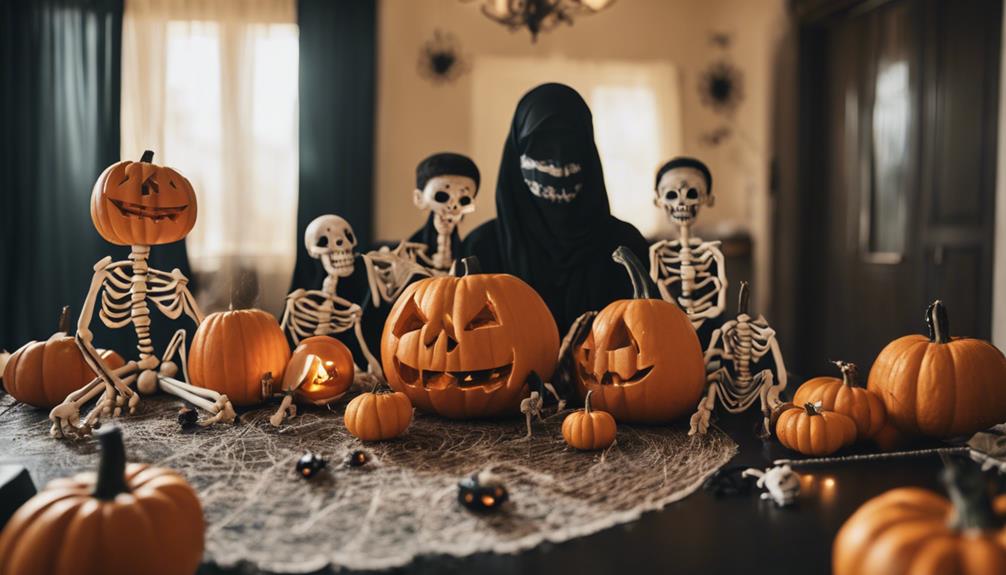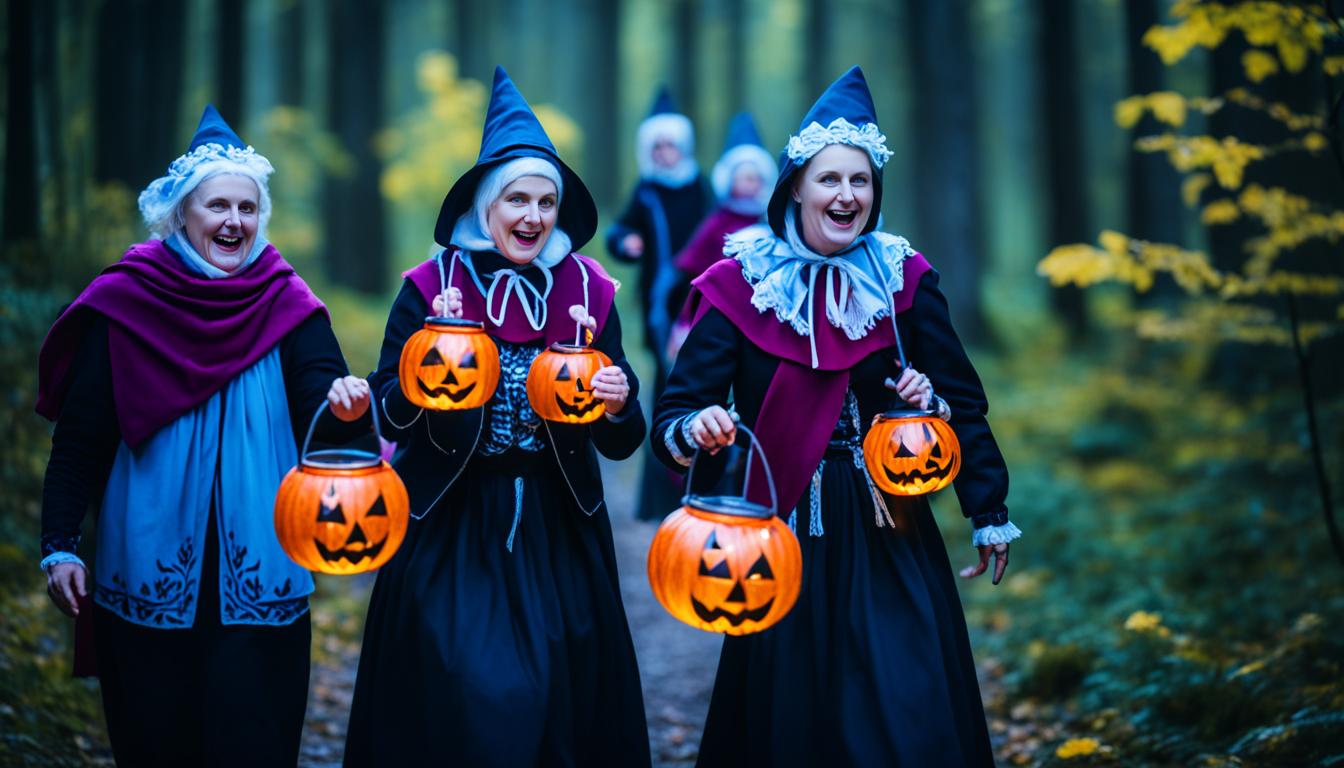The Russian Orthodox Church strongly opposes Halloween, seeing it as incompatible with traditional religious and cultural values. Church leaders argue that the holiday promotes superficial horror themes and conflicts with spiritual principles. They often discourage participation in Halloween activities and warn against Western cultural influences. As a result, government and media efforts aim to limit its spread and protect Russian traditions. If you explore further, you’ll discover how these attitudes shape the country’s stance on Halloween.
Key Takeaways
- The Orthodox Church in Russia opposes Halloween for conflicting with religious and moral principles.
- Church leaders view Halloween as promoting superficial, supernatural-themed celebrations contrary to spiritual values.
- Religious authorities see Halloween as a Western cultural import threatening traditional Russian identity.
- The Church advocates for preserving Russian moral standards and discourages participation in Halloween festivities.
- Opposition is reinforced by government policies aimed at limiting Halloween’s influence and protecting religious beliefs.

In Russia, the Orthodox Church has voiced strong opposition to Halloween, viewing it as incompatible with traditional values and religious beliefs. This stance has significant implications for the cultural impact of Halloween within the country. While Halloween has become popular in many parts of the world as a fun, festive occasion, in Russia, it’s seen as a Western import that threatens the country’s cultural identity. The church argues that Halloween promotes superficial celebrations centered around horror and supernatural themes, which conflict with Russian spiritual and moral principles. As a result, many Russians see participating in Halloween festivities as a deviation from their cultural norms and religious convictions.
The Orthodox Church in Russia opposes Halloween, viewing it as a threat to traditional values and spiritual principles.
The Russian government’s policies further reinforce this opposition. Authorities have taken steps to limit the holiday’s influence, often citing the need to preserve national traditions and protect public morality. For example, some regional administrations have issued warnings against Halloween-related events, and in certain cases, authorities have canceled or refused permits for public celebrations. These government policies aim to curb the spread of what they perceive as Western cultural infiltration, emphasizing the importance of maintaining Russia’s historical and religious identity. This approach reflects a broader effort to control cultural influences that could undermine traditional values, especially those promoted by the Orthodox Church.
You might notice that despite the growing presence of Halloween-themed decorations, costumes, and parties, official support remains minimal or absent. Schools and community centers are often discouraged from organizing Halloween activities, and media outlets are careful about how they portray the holiday. This is part of a deliberate effort to prevent Halloween from becoming a widespread cultural phenomenon that could challenge the country’s moral fabric. The government’s stance underscores a desire to foster a sense of national pride rooted in Russian Orthodox values, resisting what is seen as a foreign cultural trend. Additionally, the government actively promotes cultural preservation initiatives to strengthen traditional Russian customs and values in the face of Western influence.
In this context, you’ll see that the cultural impact of Halloween in Russia remains limited compared to other countries. While some young people might celebrate privately or online, public displays are usually subdued or discouraged. The government policies serve as a barrier to the holiday’s acceptance, reinforcing the traditional view that Halloween is not compatible with Russian cultural and religious standards. This combination of church opposition and government regulation aims to preserve Russia’s unique cultural landscape, resisting the commercialization and secularization associated with Halloween elsewhere. Ultimately, it’s a reflection of the country’s broader effort to safeguard its cultural identity against Western influence.
Frequently Asked Questions
How Has the Russian Government Responded to Halloween Celebrations?
You might notice that the Russian government has generally taken a cautious approach to Halloween, influenced by church views and cultural adaptation. They often see it as a Western import that clashes with traditional values. Authorities sometimes discourage celebrations, emphasizing the church’s influence in promoting more conservative attitudes. This reaction reflects efforts to preserve Russian cultural identity while resisting the widespread adoption of Halloween practices.
Are There Any Legal Restrictions on Halloween Events in Russia?
You might wonder if there are legal restrictions on Halloween events in Russia. The government enforces religious restrictions that limit public celebrations seen as conflicting with traditional values. Authorities focus on maintaining public safety, which sometimes leads to banning or restricting Halloween festivities, especially in schools or public spaces. While not outright illegal everywhere, these measures aim to prevent conflicts with religious groups and guarantee safety during public gatherings.
How Do Russian Parents View Halloween for Their Children?
Imagine a night where children’s costumes become a tapestry of fantasy, yet many Russian parents see it as a storm cloud of concern. They worry about the influence of Halloween’s spooky themes, fearing it might undermine traditional values. For them, Halloween isn’t just fun; it’s a battleground for their children’s innocence. Parental concerns often outweigh the excitement, making them cautious about embracing the holiday’s playful, eerie charm.
Has Halloween Influenced Russian Cultural or Religious Traditions?
You might wonder if Halloween has influenced Russian cultural or religious traditions. While it’s gained some popularity, Christian opposition remains strong, viewing it as incompatible with traditional values. Still, you’ll see some cultural adaptation, with people celebrating Halloween as a fun, secular event. However, it hasn’t become a significant part of Russia’s religious practices, and many still see it as outside their cultural or spiritual norms.
What Alternative Celebrations Are Held in Russia During October?
During October, you can enjoy Russia’s traditional festivals like the Harvest Festival, celebrating autumn’s bounty with music, dancing, and local foods. Cultural adaptations also include folk events and regional fairs that highlight Russia’s rich heritage. These celebrations often emphasize historical and cultural roots, offering an alternative to Halloween. You might participate in outdoor activities, explore traditional crafts, or attend community gatherings that honor Russia’s unique customs and seasonal traditions.
Conclusion
As you see, the church’s opposition to Halloween isn’t just about resisting a holiday; it’s like a fortress guarding traditions from the creeping tide of Western influence. While some celebrate freely, others stand firm, rooted in faith and history. In this cultural clash, you realize that each side’s voice adds a thread to Russia’s complex tapestry. Ultimately, whether you agree or disagree, it’s a reminder that tradition and modernity often dance a delicate waltz, shaping identities along the way.









